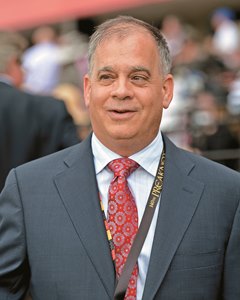The Stronach Group Reconsiders Massachusetts Venture


The Stronach Group is maintaining an interest in expanding into the Boston market, but only if statutory and regulatory changes favorable to the company are implemented.
Tim Ritvo, The Stronach Group's chief operating officer, submitted a formal letter to the Massachusetts Gaming Commission this week outlining those conditions.
Ritvo informed the MGC that, although The Stronach Group explored partnering with Raynham Park owner George Carney to renovate the former greyhound racing facility and convert it to a Thoroughbred track with a six-furlong or seven-furlong turf course, those plans have been abandoned.
"Under the current legislation, which requires a mile track and 100 days of racing, our initial desire was to partner with Raynham Park," Ritvo wrote. "We were hoping to accomplish this with minimal disruption to the facility and roadways in order to start racing in 2018. However, after reviewing the existing layout, we have determined that the land will not accommodate a mile track, as well as barns and other necessary amenities without major construction."
The current Massachusetts racing statute does not require 100 live racing days but mandates a racetrack conduct a live meeting of "a minimum of from one to 50 days" in order to be licensed. The one to 50 days rule also applies to the profitable simulcasting and advanced deposit wagering account rights.
Suffolk Downs, which holds the lone Thoroughbred racing license for the Boston area and retains the simulcasting and ADW rights, ran eight days of live racing in 2017 and applied to the MGC for a six-day live meet in 2018.
"The Stronach Group will continue to explore all of our options, which could include reconfiguring an existing track to accommodate the current requirements, or purchasing available property," Ritvo wrote. "However, we cannot do this without your support of a favorable change to current legislation concerning simulcasting and ADWs."
Ritvo has not responded to requests for comment on the issue.
The Stronach Group executive P.J. Campo represented the company at the Oct. 18 meeting in Boston of the Horse Racing Committee, a subcommittee of the MGC. At that meeting the HRC voted 4-1 to recommend a cut to the Thoroughbred horsemen's share of the state's lucrative Race Horse Development Fund and give a larger split—60%/40%—to the Standardbred industry. It was the second time in two years the Thoroughbred side took a hit, after the HRC initially set the splits in 2015 at 75%/25% in their favor.
SNIERSON: Committee Recommends Change to Massachusetts Fund
"Reducing or reallocating the slot revenue away from Thoroughbred racing, and the loss of the Race Horse Development Fund are also not beneficial, and will cause us to reconsider our desire to be in the Boston market," Ritvo wrote. "We would like to work with you to bring a full schedule of racing to the Commonwealth and look forward to your support."
Earlier this year horsemen were successful in defeating a bill that had advanced through the state legislature, which would have, for all intents and purposes, killed the Race Horse Development Fund and diverted the money to the public sector.
